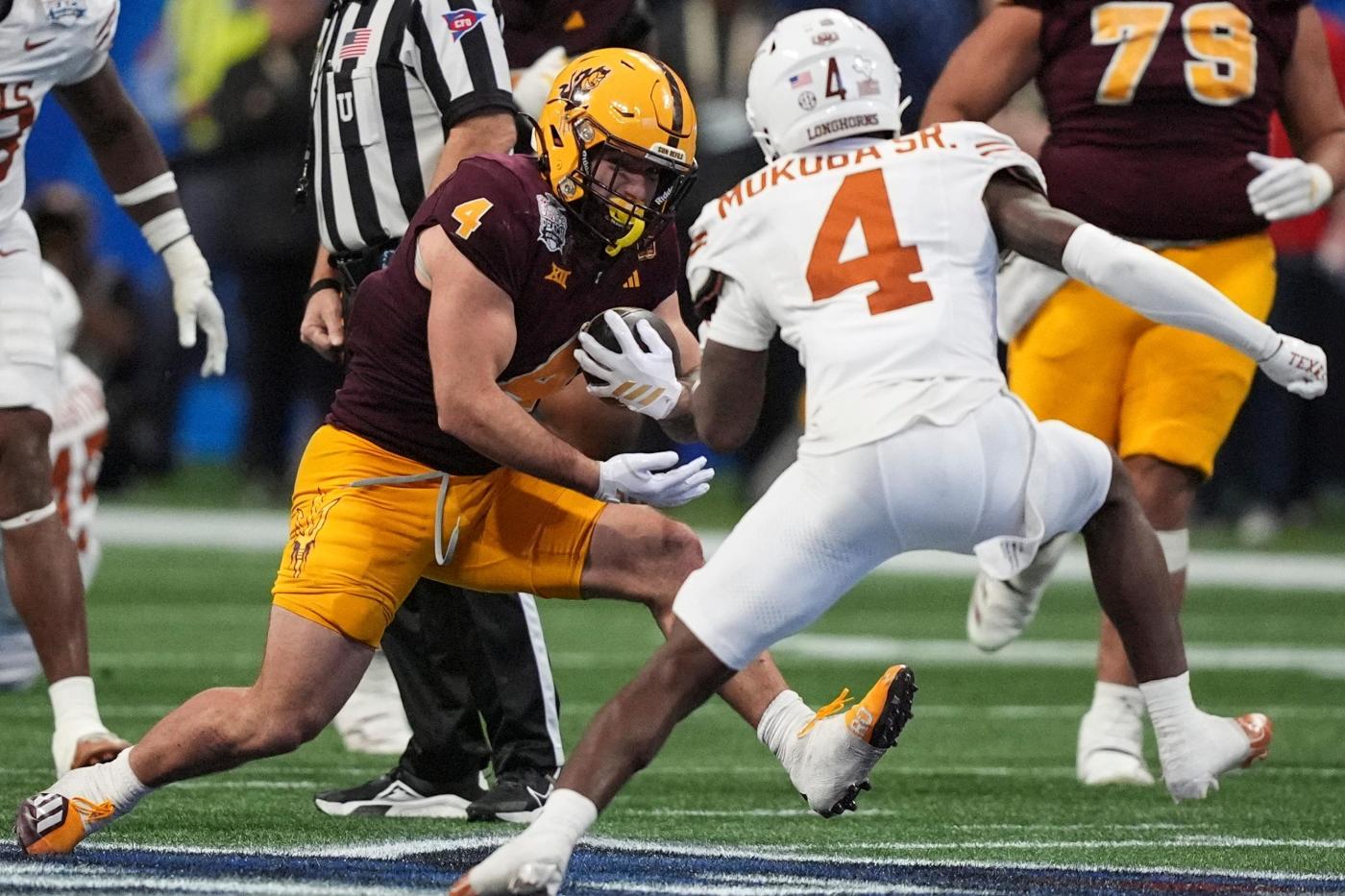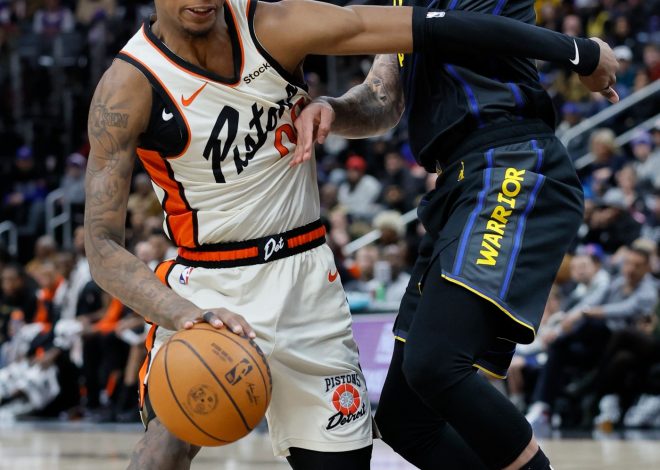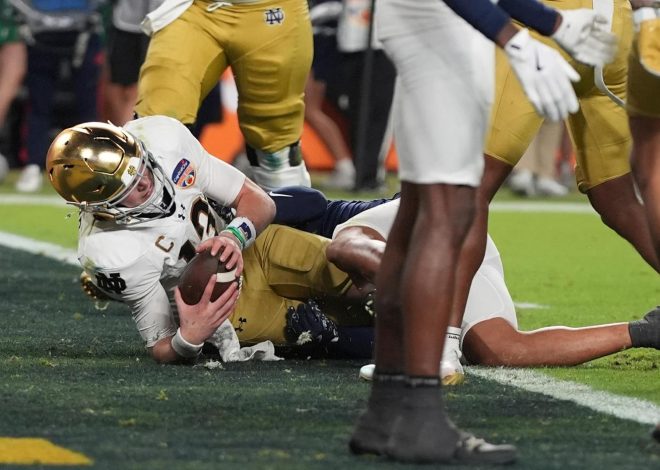
Saturday Night Five: WSU antes up, Arizona State draws a crowd, Cal’s second chance, Oregon’s epic loss and more
Instant reaction to significant weekend developments, both on and off the field …
1. Washington State’s big commitment
Although it drew little attention regionally and zero reaction nationally, a comment by WSU athletic director Anne McCoy packed quite a wallop at Hotline headquarters.
During a wide-ranging interview, McCoy told the Spokesman-Review that the Cougars have allocated $4.5 million for the football assistant coaches’ salary pool in 2025.
That’s approximately $800,000 more than WSU paid its coordinators and assistants in 2024, according to USA Today’s college football salary database.
It’s $200,000 more than Oregon State paid its staff in 2024.
And it’s $1.6 million more than Boise State’s assistants, the highest-paid staff in the Mountain West, earned in 2024.
Put another way: Assuming a reasonable year-over-year increase for cost of living and other matters, WSU could very well have the largest salary pool for assistant coaches in the rebuilt Pac-12 when the conference ramps up in 2026.
That constitutes a major development given the tenuous financial situation in Pullman and the modest compensation agreement with new coach Jimmy Rogers, who reportedly will earn just $1.57 million annually (on average).
The Hotline noted last week that Rogers’ deal “should be cause for concern among WSU constituents” because the amount “would rank sixth among the seven coaches at schools participating in the Pac-12 in 2026.”
But we also wrote this: “Let’s wait for Rogers to fill out his coaching staff before drawing initial conclusions on the funding level for WSU football.”
Based on McCoy’s comments, it appears the Cougars decided to ante up in a crucial area.
2. Arizona State’s large number
TV ratings for the College Football Playoff quarterfinals were impressive considering the lopsided nature of the Rose Bowl and the challenging kickoff windows for the other three games.
The Granddaddy drew 21.1 million viewers, which was down from the 27.6 million who watched last year — Alabama and Michigan played a thriller in the semifinals — but nonetheless marked the largest audience for any game this season.
Also noteworthy: 17.3 million watched Texas outlast Arizona State in overtime. According to SportsMediaWatch, the audience is “the largest on record for a bowl game that began prior 3 p.m. (Eastern).”
Add the viewership from the Big 12 championship, and 28 million fans watched ASU’s final two games.
That’s roughly three times the combined audience for the Sun Devils’ 12 regular-season games.
In other words: Many college football fans saw tailback Cam Skattebo play for the first time in what became his final game.
Oh, well. Their loss.
3. Cal’s massive opportunity
In the span of one week, the Bears sustained a brutal double-whammy at the most important position.
On Dec. 4, quarterback Jaron Keawe Sagapolutele, a four-star recruit from Hawaii who had been committed to Cal for five months, flipped his allegiance and signed with Oregon.
On Dec. 11, the Bears’ starting quarterback, Fernando Mendoza, announced he would enter the transfer portal.
Just like that, the program lost its present and its future.
(A few days later, the Bears would lose their bowl game, too, and finish with a 6-7 record.)
But out of nowhere, hope has reappeared.
On Friday, Sagapolutele announced he would enter the transfer portal, explaining to ESPN that “I just felt that I wasn’t a main priority” at Oregon. “Of course there’s going to be competition anywhere I go. But I’m just looking at other QB rooms and the best place for me to go get on the field early.”
More than 24 hours later, Sagapolutele’s destination remains a mystery. But Hotline sources believe Cal is the frontrunner for his services given the longstanding connection to the staff and the potential to play immediately.
And we mean immediately.
If he lands in Berkeley this month, Sagapolutele very well could start the season opener Aug. 30 at Oregon State.
4. Oregon’s epic loss
Three days later, the Hotline is still attempting to comprehend the demolition we witnessed first-hand in the Rose Bowl.
Blowouts happen each year in the College Football Playoff, but not like that.
Not when the No. 1 seed — and the nation’s only undefeated team — is obliterated with such ease and speed that the game is effectively over midway through the second quarter.
So momentous was the fail that we sought context from 11 years of CFP results.
Here’s what we found:
— Oregon was the seventh No. 1 seed to lose but just the third to lose before the championship game, along with Alabama in 2014 and Clemson in 2017. (Obviously, both lost in the semifinals.)
— The six previous losses by No. 1 seeds were by an average of 12.8 points. The Ducks lost by 20.
— Only one No. 1 seed has lost by a larger margin than Oregon: In the championship game for the 2018 season, undefeated Alabama lost 44-16 to Clemson.
Related Articles
Mailbag: CFP revenue breakdown, ESPN and Fox impact, B10 FB schedules
CFP winners, losers: From ASU and Ryan Day to ESPN, the ACC and Oregon
Ohio State whacks Oregon in Rose Bowl: CFP format costs Big Ten champion
Big 12 MBB power rankings: Iowa State on top; WVU rises after KU upset
WBB power rankings: UCLA, USC and Cal remain on top
So those inclined could make the case that Oregon’s loss wasn’t the worst by a No. 1 seed in CFP history — except 2018 Alabama at least won its semifinal game (by 11 points over Oklahoma), and its deficit at halftime against Clemson was 15 points.
The Ducks trailed by 26 at halftime.
In the 38 playoff games across 11 years, there has never been anything like it.
5. Arizona’s huge win
We’ll conclude with a basketball matter of high interest on the Hotline: The trajectory of Arizona’s season.
Typically, coach Tommy Lloyd’s crew has an NCAA Tournament berth secured by this point, thanks to stellar results in non-conference matchups.
But these Wildcats entered 2025 with a 7-5 record and a surprisingly narrow path into the NCAAs.
If they climb into the 68-team field, the Wildcats might look back on Jan. 4 as the turning point.
The 72-67 victory at No. 16 Cincinnati, fueled by a stout defensive performance, was their first Quadrant I win, their first road win and their first victory over a ranked opponent.
They have a chance to build momentum Tuesday evening at West Virginia on the second leg of their longest, toughest trip of the season.
*** Send suggestions, comments and tips (confidentiality guaranteed) to [email protected] or call 408-920-5716
*** Follow me on the social media platform X: @WilnerHotline


